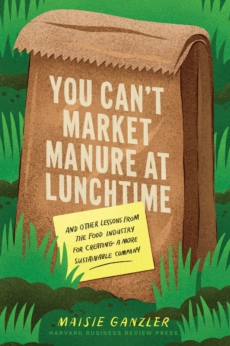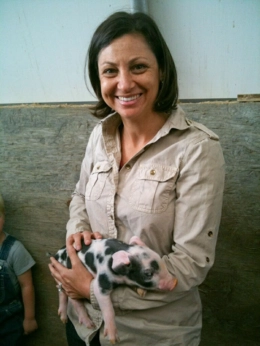
[ad_1]
The title of Maisie Ganzler’s new guide, You Can’t Market Manure at Lunchtime: And Different Classes from the Meals Trade for Making a Extra Sustainable Firm, was born out of an expertise Ganzler had whereas working as chief technique and model officer at Bon Appétit Administration Firm. Bon Appétit is a meals service firm that caters for universities and companies, working greater than a thousand cafes throughout the nation.
When difficult its pork producer about its use of manure lagoons and the myriad well being and environmental points they pose, Ganzler knew that Bon Appétit’s finish purpose was not solely to supply extra sustainable pork however to have the ability to talk successfully with its prospects in regards to the subject—one thing that’s fairly tough, since nobody needs to speak about manure once they’re consuming.
This rigidity is on the coronary heart of Ganzler’s new guide: How can firms apply genuine sustainability and work it successfully into their advertising and marketing technique? Within the guide, Ganzler particulars Bon Appétit’s progress and missteps in navigating points akin to farmworker rights, pigs raised in gestation crates, chickens in cages, and extra. The guide, which comes out April 2, additionally consists of interviews with different business consultants who speak about their experiences, together with: Rob Michalak, former world director of social mission for Ben & Jerry’s, who talks about integrating sustainability into operations and his expertise with Milk with Dignity organizers; Gary Hirshberg, co-founder of Stonyfield Natural, who discusses choosing your battles and taking stands on points; and Lisa Dyson, CEO and co-founder of Air Protein, who talks about creating different protein and striving to be the primary meat firm on this planet.
This interview has been edited for size and readability.

Fashionable Farmer: In your guide, you say that when a enterprise does one thing proper or makes progress towards a sustainability goal, it ought to get credit score for it. This may bolster the enterprise, however you write that it could possibly additionally create a ripple impact towards business change. How so?
Maisie Ganzler: An important instance of that was in 2005, once we at Bon Appétit made a dedication to cage-free eggs nationwide. We heard that the consumer at one other company mentioned to their meals service supplier, ‘We’d like cage-free eggs served right here,’ and the meals service supplier mentioned ‘Oh, we are able to’t do this. There’s not sufficient out there, blah, blah, blah,’—all these excuses. And the consumer mentioned, ‘Effectively, Bon Appétit does it for his or her places. So, I’m certain you are able to do it right here, too.’ That’s the ripple impact that I’m speaking about—as soon as an organization has confirmed that one thing is feasible, different firms now want to come back to the desk and do the identical.
MF: One thing you labored on passionately was sourcing pork from producers that don’t home pigs in gestational crates. You didn’t attain this purpose in a single day however by way of a sequence of milestones. You finally completed this with pork producer Clemens Meals Group, on which Fashionable Farmer reported right here. To get there, you first needed to hear huge firms inform you no, it wasn’t doable. Why did you push on regardless? How had been you assured you could possibly obtain one thing that wasn’t being broadly completed at such a big scale?
MG: I pushed on for 2 primary causes. One was that it was merely the best factor to do. Should you’ve seen a sow in a gestation crate, it’s heartbreaking. They will’t flip round, they will’t stroll; it is vitally clear that one thing higher might be completed for that animal. So, that’s the place we begin, rooted in the concept it’s the best factor to do for the animal. However as you’ve identified, we’re additionally a enterprise and we wish to get market credit score. And we had made a public promise, and I used to be not going to return on that. So, whereas I used to be clear in regards to the difficulties and about lacking the deadline, I by no means needed to say it could possibly’t be completed. Was I assured that it might be completed? Not essentially, however I don’t want confidence to maintain pushing ahead.
MF: You advise firms to personal their challenges and obstacles to attaining their sustainability targets—one thing that may be tempting to cover. Why is it truly higher to be clear about these items?
MG: Being clear is necessary as a result of one, it is going to insulate you to some extent from greenwashing claims. In case you are the individual that’s stepping ahead and saying right here’s the place we fell brief, no person can have that “gotcha” second. The opposite factor is that it truly will get you extra credit score ultimately. Should you faux that every thing’s straightforward to do, why ought to anyone have fun that you just did it? Should you’re clear about how difficult it was, what number of bumps there have been within the street, what number of occasions you failed and redoubled your efforts, how way more costly it was, then all of the extra cause for patrons or advocacy teams to laud your accomplishment whenever you lastly do pull it off.
I don’t assume that anyone on the buyer aspect, anyone cheap, expects perfection from an organization. However they do anticipate honesty. And I believe that’s an affordable expectation. One of many issues that I talked to Gary Hirshberg about, the founding father of Stonyfield, is he talked about individuals needing to make an emotional reference to the model, particularly in the event you’re asking them to spend more cash on one thing. Simply what I used to be speaking about [with] gestation crates, and the way they’re so horrible for sows, that cuts to my coronary heart, not essentially to my head, as a result of it’s extra environment friendly, it’s more cost effective, however my coronary heart tells me one thing totally different. And so much about constructing an genuine model primarily based upon sustainability is listening to your coronary heart and being open together with your coronary heart.
Should you’re not genuine in your want to make actual change, I believe that folks odor that. And you may very well have one thing backfire. As an alternative of [achieving] what you need, you could be in a worse place in the event you’re inauthentically making these guarantees.

Ganzler holds a piglet. (Images offered by Maisie Ganzler)
MF: You speak about how in Bon Appétit’s Farm to Fork program, you don’t require that producers be licensed natural, however you do require that farms be owner-operated. As a farmer in St. Louis informed you, in the event you’re a small farm, you possibly can’t afford to scrap a complete discipline when you’ve got a fungal outbreak, you want to have the ability to apply a fungicide. Should you held agency to requiring natural certification, you’d find yourself placing the squeeze on a few of your smaller producers. When setting a sustainability purpose, how do you make it possible for the parameters you select can truly provide help to obtain your required end result?
MG: It’s important to first be actually away from what your required end result is. So, for the Bon Appétit Farm to Fork program, the specified end result was to assist farmers that had been rising for style—that was the preliminary impetus of this system: to get the best-tasting meals. And to try this, we determined that we needed to assist small-scale farmers that had been near us that had been capable of develop for taste, versus develop for conformity or transportability or a complete host of different causes. Be actually clear about what your purpose is.
MF: Contemplating Bon Appétit’s dimension and attain, you encounter a whole lot of points in our meals system. You’re employed with producers throughout a large geography and advocates on a large breadth of points. Out of your perspective, what are the largest points in our meals system proper now?
MG: From sitting within the chair of a meals service firm that’s a purchaser, I believe that the largest points actually encompass animal agriculture, how animals are handled and the impacts that the elevating of these animals have on the environment. And there’s a whole lot of various things in play. And there’s a whole lot of robust opinions but additionally some conflicting data. So, I’d say that there’s a complete host of points round animal agriculture.
MF: For small farmers or meals companies that don’t have a advertising and marketing division, finances or coaching, do you’ve gotten any recommendation for a way they will nonetheless inform their story successfully?
MG: I believe that the very first thing is that they want to determine what their story is and distill it down. If they’ve a bundle, what can they placed on the bundle that shortly communicates essentially the most salient factors of their story, not the encyclopedic model of it, as a result of nobody’s going to take time to learn that. Everyone’s bought a web site, so the identical factor there, actually determining what your headline is and succinctly speaking that to your prospects. And making that headline one thing that does create an emotional reference to individuals. Not being afraid to take a stand, whether or not that’s within the points you tackle, the way you speak about them or the place you speak about them.
What I used to be making an attempt to speak within the guide is the significance of each making significant change and getting market credit score for it. And that’s the place the title comes from—You Can’t Market Manure at Lunchtime. There was this actual environmental change we had been after, coping with manure lagoons, however we additionally wanted to have the ability to speak to prospects about it. As a result of we aren’t advocacy teams, we’re for-profit firms. However we’ve the facility to do good on this world and capitalize on it. And there’s nothing shameful about that duality.
The publish When Company Sustainability Targets Are Good for Enterprise appeared first on Fashionable Farmer.
[ad_2]